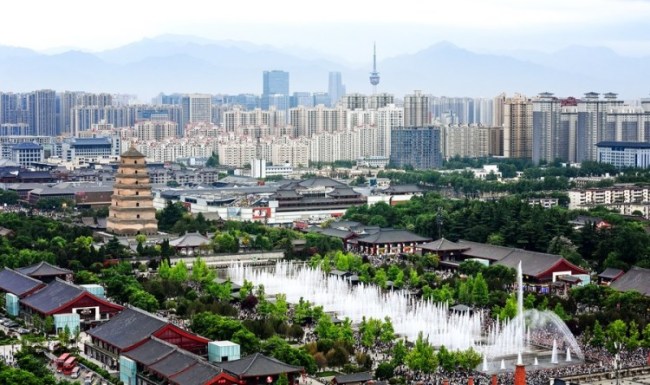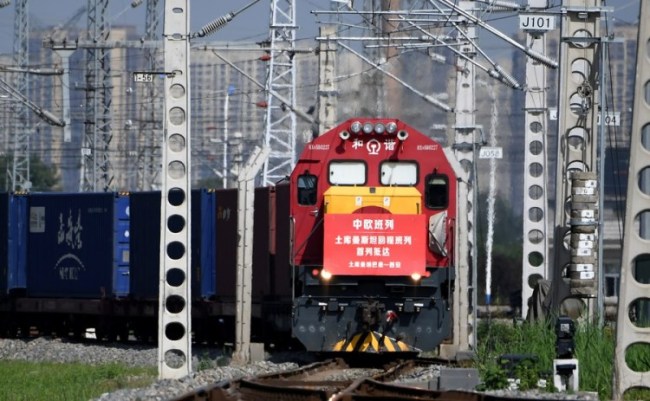* Founded about 3,100 years ago, Xi'an, which is today the capital of China's Shaanxi Province, served as the capital for 13 dynasties in Chinese history. This is also the place where Zhang Qian began his journey to the Western regions via Central Asia during the Western Han Dynasty (around 202 BC-AD 25) with his envoys. This expedition eventually led to the opening of the Silk Road.
* Rich historical sites of Xi'an bear the indelible imprints of China's profound traditional culture and time-honored civilization. The city offers an opportunity for both locals and international visitors to immerse themselves in the ancient splendor that dates back over a thousand years.
* The city's confident and inclusive culture has captivated global interest, evidenced by its hosting of prestigious international events such as the Silk Road International Film Festival, Silk Road International Exposition, and the upcoming China-Central Asia Summit.
XI'AN, May 12 (Xinhua) -- The opening of direct flights last month between northwest China's Xi'an and Astana, capital of Kazakhstan, brought good tidings for Ushurova Sofiya, as the 49-year-old Kazakh woman who lives in Xi'an frequently travels between the two countries.
"During my first trip to Xi'an in 2004, I had to first fly to Xinjiang Uygur Autonomous Region and then take a train. It was really a time-consuming journey," recalled Sofiya.
This year Xi'an is hosting the China-Central Asia Summit scheduled on May 18 and 19.
Four direct passenger routes have been launched between Xi'an and Central Asia so far this year, including destinations such as Almaty, Bishkek, Tashkent and Astana. Transportation convenience has attracted an increasing number of foreigners like Sofiya to visit or stay in the ancient Chinese capital.

ANCIENT GLORY
Founded about 3,100 years ago, Xi'an, which is today the capital of China's Shaanxi Province, served as the capital for 13 dynasties in Chinese history. This is also the place where Zhang Qian began his journey to the Western regions via Central Asia during the Western Han Dynasty (around 202 BC-AD 25) with his envoys. This expedition eventually led to the opening of the Silk Road.
During its heyday in the Tang Dynasty (618-907), when it was known as Chang'an, the city attracted a significant influx of foreign merchants, envoys, and students from various countries.
Home to a number of world-renowned historical sites, including the Bell Tower and the Giant Wild Goose Pagoda, Xi'an evokes a nostalgic reflection of its glorious past. Several modern cultural blocks boasting a blend of shopping, dining and other recreational activities have been built based on historical heritages, which endow the metropolis with a unique charm.

Enthralled by its profound history and time-honored culture, Sofiya made the momentous decision to pursue her career at the School of Law, Xi'an Jiaotong University. With nearly two decades of residency in Xi'an and having married a local, Sofiya has acquired an extensive understanding of the city's notable historical landmarks.
"Xi'an boasts treasures like the Terracotta Warriors, the Bell Tower and the ancient city wall of the Ming Dynasty (1368-1644). I would like to show around these sites to my family and friends, and tell them the captivating historical tales. It is a vibrant city with rich history and a promising future," Sofiya said.
Xi'an is also hailed as a city of poetry. During the Tang Dynasty, numerous scholars and poets visited the then Chang'an, seeking literary discussions, camaraderie, and poetic indulgence.
Even today, remnants of that era can be found in Xi'an, with place names like Fanchuan and Qujiang, which frequently graced the verses of famous Tang poems.

These historical treasures have also influenced the design of subway stations in Xi'an, seamlessly blending the past and present. Li Qingke, a visitor from Shanghai, aptly remarked, "In Xi'an, the subway becomes a time tunnel, whisking us away to the splendors of ancient times."
Xi'an integrates the style of the ancient capital with modern life, retaining ancient charm and nostalgia, said Shang Ziqin, a famous cultural scholar from Shaanxi.
According to a citizen named Du Yuan, the rich historical sites of Xi'an bear the indelible imprints of China's profound traditional culture and time-honored civilization. The city offers an opportunity for both locals and international visitors to immerse themselves in the ancient splendor that dates back over a thousand years.
MODERN CHARM
Xi'an has admirably maintained and harnessed its rich historical and cultural heritage.
After years of preservation work, the ancient city wall of Xi'an, alongside the surrounding scenic area with lush greenery and clear moat water, has been integrated into the urban life of Xi'an and become a popular recreational and tourism destination.
For 36 years, the city wall has been illuminated by a spectacular lantern festival, which has become a hallmark Spring Festival celebration. Additionally, a variety of other cultural activities, including kite-making and Tang poetry recitals, are regularly held here, helping to preserve and celebrate the rich and vibrant traditions of Chinese culture.
In addition to historical sites, Xi'an has a total of 159 museums, attracting over 30 million people each year. The number of museums with free entry accounts for more than 95 percent. The city has one museum for every 88,200 people on average, placing it among the highest in the country.

Nowadays, people donning traditional Chinese costumes can be spotted on the streets of Xi'an, creating an immersive experience for tourists. As visitors wander through ancient structures, indulge in local delicacies, and witness street performances like acrobatics and lion dances, they are transported back in time to the vibrant streetscape reminiscent of the Tang Dynasty.
Over the past decade, the city has made significant strides in ecological preservation, leading to remarkable improvements in its environment. As a result, an increasing number of foreigners are drawn to the city, enticed by its favorable living conditions for both work and residence.
Mehad Mousa, who hails from Egypt, is pursuing her doctoral studies in literary translation at the Northwest University in Xi'an. She expressed profound admiration for the city's rich civilization, which has left a lasting impression on her.
"The locals in this city are truly delightful. They exhibit a genuine willingness to help. Undoubtedly, the city's extensive history and profound traditional culture have played a significant role in cultivating such amiable characteristics among its people," she said.

Xi'an, known for its openness and inclusivity, has earned the endearing title of "second hometown" among numerous foreigners.
"Xi'an is a promising place for me," said Dev Raturi, a 48-year-old Indian who has lived here for years and runs an Indian restaurant. "As my business is good here, I have opened more restaurants all the way from Xi'an to Chengdu, Hangzhou and Changchun," he added.
PROMISING FUTURE
The city's confident and inclusive culture has captivated global interest, evidenced by its hosting of prestigious international events such as the Silk Road International Film Festival, Silk Road International Exposition, and the upcoming China-Central Asia Summit. The city's vibrant international scene continues to grow, expanding its "circle of friends" on an international scale. As of now, Xi'an has established 38 sister cities worldwide, further solidifying its global connections.
Sofiya said she believes the Belt and Road Initiative (BRI) proposed by China in 2013 offers numerous opportunities to countries and peoples along the route. "Many Chinese companies hope to expand their presence in Central Asian countries and they turn to me for advice," said Sofiya, who is now a professor of international law.

Chinese entrepreneur Yuan Zhaohui was one of them. In 2015, he founded Silkroad City Shop in Xi'an and has actively participated in cross-border trade with his Kazakhstan partners for a remarkable p of eight years. According to him, the China-Europe freight trains have significantly minimized the distance between nations, making the world appear smaller.
"The timing and the cost of logistics used to be two major problems in cross-border e-commerce services. But with the help of Chang'an trains, the delivery time has been shortened to two weeks from almost a month and the cost was cut by half," Yuan said.
In November 2013, the first Chang'an China-Europe freight train departed from Xi'an to Almaty in Kazakhstan. Since then, the number of Chang'an train trips has steadily increased, reaching an impressive total of 4,639 in 2022. At present, 17 routes of Chang'an trains connect Xi'an with Central Asia and Europe, including 45 countries and regions along the Belt and Road.

Shaanxi is home to more than 100 higher education institutions, over 1,300 research institutes and millions of technical personnel concentrated in the city of Xi'an. Data shows that the number of high-tech enterprises in Xi'an has exceeded 7,000.
Five industrial clusters worth over 100 billion each have been established in the city in the fields of telecommunications, automobile, aerospace, high-end equipment as well as new materials and energy.
The city is also a shining example of new industries. In 2022, the output of new-energy vehicles in Xi'an passed the one million mark, topping the country with a share of 14.1 percent. It also leads the global market share of flash chips and monocrystalline modules.
In 2022, the per capita disposable income of residents in Xi'an exceeded 40,000 yuan (about 5,757 U.S. dollars).
(by Xinhua correspondents Qiang Lijing, Sun Bo, Chu Guoqiang, Zhang Sijie, Yang Yimiao, Zhang Bin, Jiang Chenrong)
(Video reporters: Wu Hongbo, Zhang Sijie; Video editors: Liang Wanshan, Luo Hui, Zhu Jianhui, Hui Peipei, Lin Lin, Wang Han)